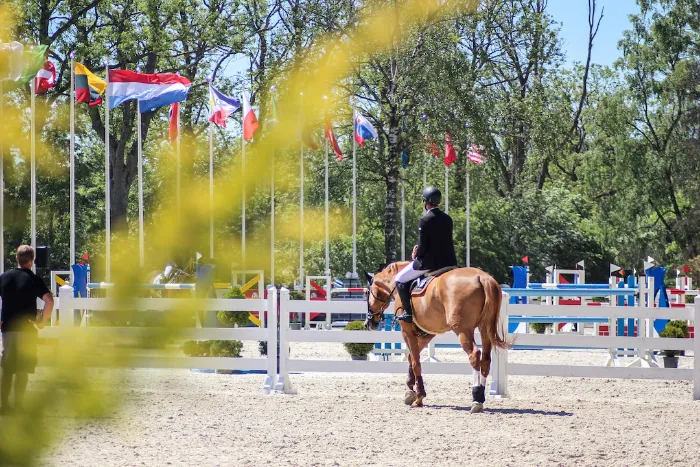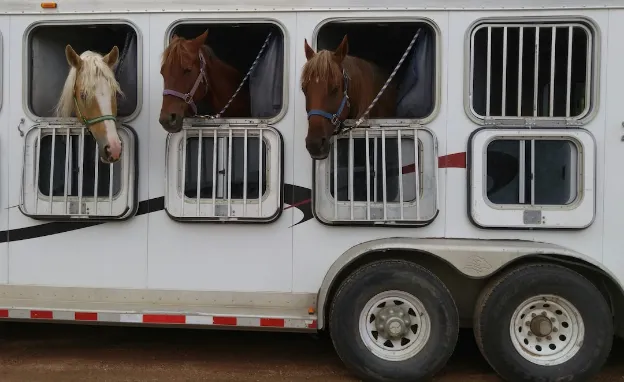Your First Big Horse Show, How To Prepare

-
How To Prepare For Your First Big Horse Show
-
The Long Leadup To The Show
-
The Days Before Haul In
-
Warm-Up Day
-
First Day Of Competition
-
Those Last Couple Of Days At The Horse Show
-
Other Bits Of Advice
-
Conclusion
How To Prepare For Your First Big Horse Show
Whether your ambitions lie in riding a big hunter derby or the dizzy heights of Grand Prix show jumping we all had to start somewhere and stepping into the show ring at your first big horse show is daunting for most people.
The Long Leadup To The Show
I'm going to say this a lot throughout my articles but the number one thing to do in those months and weeks leading up to the horse show is listen to your trainer, they'll be able to give you an idea of what division you should be aiming for.
They have at very least been competing for years and if you're with a seasoned trainer in the sport they will have taken countless newbies to their first horse show.
At this point in your riding career, you've probably at least attended some schooling shows and have an idea of how it all works but if you haven't been to a horse show where you stable for a few days or weeks then you're going to need a little help.
It's worth mentioning at this stage that there are certain things you'll want to do in advance and not leave until the last minute.
Check the closing date for entries and submit them promptly. Most horse shows require that you have vaccinations up to date, this is not something you can do days before the show.
Also, ensure that you are a member of the relevant hunter-jumper association, you can often do this right before you haul in but if this is your first horse show leaving it to the last moment will most likely add to the stress, get it done early.
The Days Before Haul In
If this is your first overnight event with your horse the best advice I can give is to make lists, the excitement of your first horse show can quickly turn to panic if you have forgotten a key piece of equipment.
You might want to make say two different lists. One for your horse, and one for you, and within those lists consider everything you need for your classes, and then the rest of the day.
For example, when it comes to your horse, do you need to pack your own feed or will it be available, what equipment do you need, do you have separate tack for the days/times you're just hacking?
For you, what clothes do you need? Pack your favorite show gear but bring backup clothing, after all, it is a day with horses and clothes get dirty. Do you need a change of clothes for when you're not riding? Bring snacks, horse show days are long and food at the venues is often expensive.
Once your horse is on the show grounds they will be required to wear their assigned number at all times when out of their stalls.
Invest in two white number plates, one for their bridle and another for their halter, that way you don't need to constantly try to remember them.
Warm-Up Day
Warm-up day is an opportunity for horses and rider to familiarize themselves with the rings and jump around a low-pressure, non-judged course.
For those of you doing jumper classes speed is rarely a factor on warm-up day although a lot of showgrounds will give you a reference time.
The course designer tends to set these patterns friendly with fences that will be used throughout the show.
Course walk is often passed over by the more experienced riders on warm-up day but if it's early in your show career it would be a good idea to take some time to walk the pattern, measure each distance and get feel for the ring before you ride.
Some horses need a little extra work in the warm-up ring on their first day, or even a lunge to settle them so allow time for that if needed.
The dress code tends to be smart casual for that day, you don't need to wear your best show attire but it's always nice to give your boots a polish.
First Day Of Competition
Be prepared, and have everything clean and ready to go the night before, this gives you a chance to double-check your tack, etc, and make sure you have a clean saddle pad.
Keep a constant eye on the schedule, things can change at a moment's notice which is why being prepared is crucial, although delays are also common at horse shows.
Be early for your course walk and if possible learn the course beforehand, most shows will have these posted on a board near the ring.
Unless your horse needs a while to settle into their work simply be on time for warm-up, too early and your horse may get bored or irritated from being out so long. Late and you'll be rushed, you want to make each jump count, horse shows are long, and you don't want your horse to get tired or sour.
Once you've warmed up and are ready for your class get yourself ringside nice and quick to watch a couple of riders go.
Take this time to go over your course plan, remind yourself of the strides in the lines, and learn the jump-off if needed.
Upon leaving the ring after your class your trainer will most likely have some feedback regarding your ride.
Take the time to listen, and be aware that you may have a spike in adrenaline so try not to talk over them, we're often on a schedule but will make every effort to talk to you before our next student.
My own advice for your first horse show is to forget about prize money and focus on clocking up some nice rounds with your horse.
Those Last Couple Of Days At The Horse Show
Your number one priority at this stage of the show is to end on a positive note. Again listen to your trainer.
As nice as it would be to finish off by winning some prize money you have to put your horse first, and only if they're fit and ready should you up the speed in your jumper classes, or go that extra mile for the hunter derby.
Other Bits Of Advice
Horse shows can be a daunting place, don't compare yourself to the riders with multiple horses who seem to go home with all the prize money, we're all on our own journey.
Seek out the top show jumping and hunter riders and watch them, the way they warm up and prepare for their classes, and even what they do when they're just hacking.
Both hunter and jumper disciplines are tough in their own way, learn from watching
both.
Help the other members of your barn family at the show, you're all riders and horse shows test you in many ways, be there for each other.
Be kind and respectful to members of staff who run the show, they most likely have longer days than you.
Always, always go to the ring to cheer on your fellow barn buddies or other competitors you may know, even if they are with other barns. They'll most likely return the gesture and you'll appreciate the support.
Conclusion
No matter if you came out a winner all week or had a rail or two in your classes, learn from the experience, the performance that the judge sees sometimes does not reflect the hard work you put in to get there.
This sport is supposed to be fun. My own personal advice for your first horse show is to compete well within your and your horse's ability and take the positives from your performance in your classes as well as the learning moments.
-
How To Prepare For Your First Big Horse Show
-
The Long Leadup To The Show
-
The Days Before Haul In
-
Warm-Up Day
-
First Day Of Competition
-
Those Last Couple Of Days At The Horse Show
-
Other Bits Of Advice
-
Conclusion








